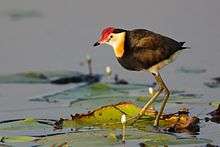Jacana
| Jacanas Temporal range: Pliocene to recent | |
|---|---|
 | |
| Comb-crested jacana (Irediparra gallinacea) | |
| Scientific classification | |
| Kingdom: | Animalia |
| Phylum: | Chordata |
| Class: | Aves |
| Order: | Charadriiformes |
| Suborder: | Charadrii |
| Family: | Jacanidae Stejneger, 1885 |
| Genera | |
The jacanas (sometimes referred to as Jesus birds or lily trotters) are a group of tropical waders in the family Jacanidae. They are found worldwide within the tropical zone. See Etymology below for pronunciation.
Eight species of jacana are known from six genera. The fossil record of this family is restricted to a recent fossil of the wattled jacana from Brazil and a Pliocene fossil of an extinct species, Jacana farrandi, from Florida.[1] A fossil from Miocene rocks in the Czech Republic was assigned to this family,[2] but more recent analysis disputes the placement and moves the species to the Coraciidae.[3]
They are identifiable by their huge feet and claws which enable them to walk on floating vegetation in the shallow lakes that are their preferred habitat. They have sharp bills and rounded wings, and many species also have wattles on their foreheads.[4]
In terms of sexual size dimorphism, female jacanas are larger than the males. The latter, as in some other wader families like the phalaropes, take responsibility for incubation, and some species (notably the northern jacana) are polyandrous.[5] However, adults of both sexes look identical, as with most shorebirds. They construct relatively flimsy nests on floating vegetation, and lay eggs with dark irregular lines on their shells, providing camouflage amongst water weeds.[4]
Their diet consists of insects and other invertebrates picked from the floating vegetation or the water’s surface.
Most species are sedentary, but the pheasant-tailed jacana migrates from the north of its range into peninsular India and southeast Asia.
Etymology and pronunciation
Jacana is Linnæus' scientific Latin spelling of the Brazilian Portuguese jaçanã. That is from a Tupi name of the bird, ñaha'nã.[6]
The Portuguese word is pronounced approximately [ʒasaˈnã]. As in façade, Provençal, and araçari, the Ç is meant to be pronounced as an S. US dictionaries give various pronunciations: /ˌʒɑːsəˈnɑː/ ZHAH-sə-NAH,[7][8] /ˌdʒɑːsəˈnɑː/ JAH-sə-NAH,[8] as well as the anglicised /dʒəˈkɑːnə/ jə-KAH-nə,[9] which is the only pronunciation in an Australian dictionary.[10] A British dictionary gives /ˈdʒækənə/ JAK-ə-nə for the spelling "jacana" and /ʒæsəˈnɑː/ zhas-ə-NAH for "jaçana".[11]
Species
FAMILY: JACANIDAE
- Genus: Microparra
- Lesser jacana – Microparra capensis
- Genus: Actophilornis
- African jacana – Actophilornis africanus
- Madagascar jacana – Actophilornis albinucha
- Genus: Irediparra
- Comb-crested jacana – Irediparra gallinacea
- Genus: Hydrophasianus
- Pheasant-tailed jacana – Hydrophasianus chirurgus
- Genus: Metopidius
- Bronze-winged jacana – Metopidius indicus
- Genus: Jacana
- Northern jacana – Jacana spinosa
- Wattled jacana – Jacana jacana
Gallery
 Pheasant-tailed jacana in Non-Breeding Plumage
Pheasant-tailed jacana in Non-Breeding Plumage- Jacana egg

_toes_W2_IMG_8525.jpg)

References
- ↑ Olson, Storrs, (1976). "A jacana from the Pliocene of Florida (Aves: Jacanidae)" (PDF). Proceedings of the Biological Society of Washington. 89 (19): 259–264.
- ↑ Mlíkovský, Jiří (1999). "A new jacana (Aves: Jacanidae) from the Early Miocene of the Czech Republic". Comptes Rendus de l'Académie des Sciences – Series IIA – Earth and Planetary Science. 328 (2): 121–123. doi:10.1016/S1251-8050(99)80007-X.
- ↑ Mourer-Chauviré, Cécile (1999). "Systematic position of Nupharanassa bohemica Mlíkovsky, 1999". Comptes Rendus de l'Académie des Sciences – Series IIA – Earth and Planetary Science. 329 (2): 149–152. doi:10.1016/S1251-8050(99)80217-1.
- 1 2 Harrison, Colin J.O. (1991). Forshaw, Joseph, ed. Encyclopaedia of Animals: Birds. London: Merehurst Press. p. 108. ISBN 1-85391-186-0.
- ↑ Jenni, Donald A.; Gerald Collier (1972). "Polyandry in the American Jaçana (Jacana spinosa)". The Auk. 89 (4): 743–765. doi:10.2307/4084107.
- ↑ Ferreira, A. B. H. (1986). Novo Dicionário da Língua Portuguesa (Second ed.). Rio de Janeiro: Nova Fronteira. p. 978.
- ↑ "American Heritage Dictionary" (Fourth ed.). 2009. Retrieved 2009-08-13.
- 1 2 "dictionary.com Unabridged. Based on the Random House Dictionary". 2009. Retrieved 2009-08-13.
- ↑ "jacana – definition from the Merriam-Webster Online Dictionary". Retrieved 2009-08-13.
- ↑ "The Macquarie Dictionary Online". Macquarie Dictionary Publishers Pty Ltd. 2009. Retrieved 2009-08-13.. Subscription required.
- ↑ The New Shorter Oxford English Dictionary. Clarendon Press. 1993. and "Definition of jacana in English". Language Matters. Oxford Dictionaries.
External links
| Wikimedia Commons has media related to Jacanidae. |
- Jacana videos on the Internet Bird Collection